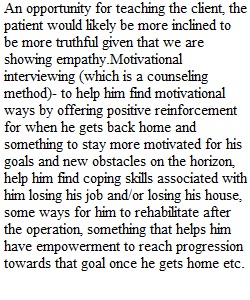


Q For the short case study (written below), answer the following questions and be ready to discuss in your small group (each group is assigned a few questions): As a nurse, you invest a significant portion of your nursing practice teaching patients strategies to prevent illness, promote or restore health, or to facilitate coping with life’s circumstances. You are currently preparing the exam room for pre-operative consultation with your patient, a 47-year-old computer engineer who will undergo a below-the-knee amputation as a result of inadequate circulation secondary to uncontrolled diabetes. His wife voices frustration over her husband’s seeming lack of concern regarding the seriousness of his condition. Additionally, upon assessment you note the client's foot is pale and pedal pulses are weak (indicating poor circulation). His temperature is 101F and he states he has had diarrhea for 2 days and complains of pain in both legs. Another concern the client has is that he is afraid he will lose his job and thus lose his home. Groups 1, 2 and 3: 1. Why is it important to assess patient learning needs and readiness before teaching? 2. What would you expect to teach your patient regarding safety? 3. Which patient perceptions can enhance motivation to learn? Groups 4 and 5: 1. Why is it important to demonstrate warmth, openness, and friendliness? 2. How might motivational interviewing assist in this case? What skills are needed? 3. Describe important teaching topics in restoring the patient’s health. Groups 6 and 7: 1. How would you assist this patient to facilitate coping for any significant life changes? 2. Outline strategies that would maximize patient teaching efficacy. 3. If patient noncompliance is an issue, what could be contributing factors? Groups 8 and 9 1. In thinking about the phases of the helping relationship, describe which aspects of this case involve the orientation phase. What other aspects would the nurse include in the orientation phase of the helping relationship? 2. What about the working phase of the helping relationship? What would the nurse include in the working phase? 3. What would the nurse do in the termination phase of the helping relationship with this client? Grade: You will be graded on completion----each group needs to address both of their assigned questions and type the answer on a word document. Can be in bullet point format. No references required. PreviousNext
View Related Questions